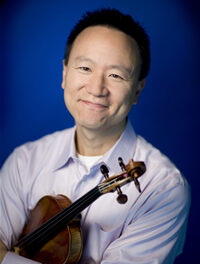David Biedenbender: All We Are Given We Cannot Hold. Shell and Wing (2018), text by Robert Fanning, Pittsburgh New Music Ensemble (PNME), recorded July 6, 2022 at the Pittsburgh City Theatre, Pittsburgh, PA.; Red Vesper (2014) recorded April 14-15, 2019 at Blue Griffin Studios, Lansing, MI., Garth Newel Piano Quartet with Mingzhe Wang, clarinet; all we are given we cannot hold (2022), text by Robert Fanning, HAVEN TRIO, recorded at Blue Griffin Studios; Solstice (2018) Garth Newel Piano Quartet, recorded at Blue Griffin Studios; TT 77:54; $15.99; © ℗ 2023 Blue Griffin Recording, Inc.
David Biedenbender’s new portrait album is a collaborative work with poet Robert Fanning, with performances by Garth Newel Piano Quartet with Mingzhe Wang, clarinet; the Pittsburgh New Music Ensemble (PNME); HAVEN TRIO; featuring Lindsay Kesselman, soprano.
Wrestling with a profound loss, Biedenbender found solace and inspiration reading Fanning’s poetry. When a commission to write a piece for Bill Ryan and the Grand Valley State University New Music Ensemble came his way in 2014, Biedenbender dove into his work transformed. This collection represents ten years of concerted effort, a close friendship between two artists, and performances that will surprise you and hold you rapt.
The recording begins with Shell and Wing, a stunning piece with text by Fanning and performed by Pittsburgh New Music Ensemble. Kesselman, who is presently Assistant Visiting Professor of Music at UNC-Greensboro, sings with a glorious tone, astonishing range, and a rare ability to infuse the music with emotional tenderness.
The first of two movements (“Shell”) is the voice of the parent who is stricken with intense desire to protect the young child. Dynamics, word painting (a Baroque term I use here loosely), and select word repetition are part of Biedenbender’s tool kit he employs to create an exquisite text setting. “Wing” starts with a gentle piano passage before a vibraphone emerges, and we hear an enchanting, dream-like vibraphone/soprano duet. PNME plays with remarkable finesse; they are the perfect interpreters of this composition, especially the percussion in the second movement. And though the human voice uniquely captures text, Kesselman plays her instrument with care, never upstaging the others. Her nuanced performance touched me; but one does not have to be a parent to shed a tear.
Biedenbender drew text from three of Fanning’s collections of poetry to create all we are given we cannot hold (seven movements in all). He describes this work as “simple” and the “most direct” of the song settings. Yet I found the music and the poetry to be profound, especially the three I discuss here. HAVEN TRIO performs them.
“The Darkness, Literal and Figurative” begins with repeated descending minor thirds, the interval I think of as fundamental to early childhood songs. In contrast, “The Thorn Birds” is a compassionate vignette about memory, a mysterious feature of aging, and the inevitability of death. But I loved the final movement, “Cuttings,” the most. The simple, mundane act of home haircuts makes me smile.
The trio performs with the grace and intimacy of musicians who know one another well and play together often. Kesselman captured the sweetness and heartbreak of life in each of these. Midori Koga‘s delicate touch on the piano keys woke me up. And clarinetist Kimberly Cole Luevano, drawing from a wide palette, wove in and out of the foreground, snatching bits of Kesselman’s vocal timbres to create a fine fabric.
There are two instrumental pieces: Red Vesper (2014) performed by Garth Newel Piano Quartet with Mingzhe Wang, and Solstice (2018) performed by just the piano quartet.
Red Vesper was a breakthrough piece for Biedenbender. His travels through the Western United States coupled with the act of writing were spiritual experiences that released him from great emotional pain. Like the magnificent Western landscape he remembered, Biedenbender’s writing is spacious. The composer says that the magnificent rock formations made him feel small, but he must have imagined a small voice whispering prayer. The clarinet melody echoes the vesper. And Wang lifts it up with precision as he warms each note with enormous heart.
The final piece is Solstice. Beginning with “Summer,” Biedenbender captures the high energy of cicadas and crickets. Time moves quickly as the earth makes this leg of the journey around the sun. But seasons change and the composer reflects, “Autumn is twilight, an ending.” Bass notes and descending half steps sound ominous. The tempo slows and with it the listeners’ perception of time. “Winter” is meditative; time slows to a crawl. Harmonics and icy sul ponticello (bow drawn close to the bridge) makes me shiver; high pitches on the piano sound like freezing water droplets on a window pain. And finally, the arrival of spring brings great JOY!
Biedenbender thanks the artists who helped “lift the music off the page.” You can read notes about the music, biographies of the performers and the poet, and credits. This is an album you will love as you listen again and again.
This album was made possible by a HARP (Humanities and Research Program) Production Grant from Michigan State University.












